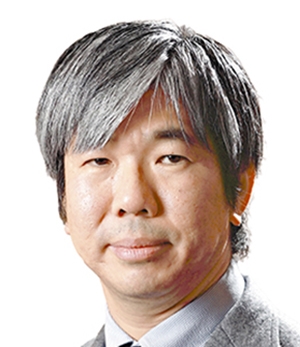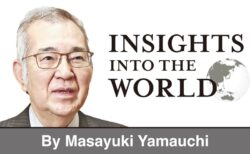11:00 JST, May 31, 2024
Eighty-six years ago, on Sept. 27, 1938, then British Prime Minister Neville Chamberlain spoke in a radio broadcast to his nation about “a quarrel in a far-away country between people of whom we know nothing.” His words expressed his ardent desire for Britain to maintain peace and not get involved in a war.
At the time, German Chancellor Adolf Hitler was claiming that the Czech people were persecuting ethnic Germans in the Sudetenland, a region of Czechoslovakia. He agitated for a military invasion of the area to “protect” German-speaking people and an eventual annexation with Germany.
For the British population, the Germany-Czechoslovakia confrontation over the Sudetenland was likely just a conflict that was taking place far away between people they did not know about, just as Chamberlain said.
Many British people did not want their country involved in the matter. In fact, they had been strongly calling on the British government to keep its distance from the issue and refrain from participating in a possible war between Germany and Czechoslovakia.
History does not repeat itself. However, there are cases in which people do not learn from history and therefore repeat the same mistakes. We are currently faced with the Russia-Ukraine war, which is showing no signs of ending. Russian President Vladimir Putin has repeatedly justified Russia’s invasion of Ukraine as an inevitable move to protect ethnic Russians in eastern Ukraine from “persecution.”
Instead of bringing about peace, Britain’s policy of allowing Germany to pursue territorial expansion unchecked led to the disaster of World War II. On Sept. 1, 1939, German troops invaded Poland at Hitler’s order. The invasion came less than a year after Chamberlain began his pursuit of the mirage of peace at the sacrifice of a small power, by opting to abandon the Sudetenland.
In May 1940, Hitler broke an eight-month stalemate on the front by ordering an invasion of Belgium, the Netherlands and France on the western front. The peace that had depended upon Hitler’s “goodwill” crumbled away.
Even then, however, there were still moves within Britain to seek peace with Germany at the expense of the territories and sovereign independence of Belgium and the Netherlands. Prime Minister Chamberlain and his foreign secretary, Viscount Halifax, were so fearful of the tragedy of an all-out war, they tried to end the conflict on the European continent by making peace with Hitler’s Germany.
Had Britain chosen to walk the path of peace with Hitler’s Third Reich ruling the European continent, and thereby amassing staggering amounts of resources and building formidably powerful armed forces, we would have experienced a different postwar history. It would certainly have involved “peace” based on oppression, slaughter and human rights violations.
Dystopian world
What would it have been like, a dystopian world called “peace” that was ruled by Hitler?
It is easy to imagine such a world by reading “The Man in the High Castle,” a science fiction novel by the U.S. author Philip K. Dick, or by watching producer Ridley Scott’s Amazon Prime drama of the same name. This is an alternate historical narrative depicting a hypothetical world where the Axis powers, including Germany and Japan, win World War II, dividing and conquering the United States and enforcing the Nazi regime’s racial policies.
The pacifism we have embraced since the end of World War II has tended, in many cases, to place too absolute and too great a value on “peace.” In other words, it has been implicitly suggested that to maintain peace, it is all right to sacrifice all other important values, such as human rights, freedom, independence, democracy and the right to self-determination.
In such an environment, it is considered “evil” to fight against unreasonable invasions and tyranny for the sake of freedom, independence and liberation.
Asked about the aims of fighting Hitler’s Nazi Germany, Winston Churchill, Chamberlain’s eventual successor as prime minister, replied: “As the humble laborer returns from his work when the day is done, and sees the smoke curling upwards from his cottage home in the serene evening sky, we wish him to know that no rat-a-tat-tat of the secret police upon his door will disturb his leisure or interrupt his rest.”
Churchill understood the irreplaceable importance of a “normal, peaceful life” that must be protected, even by fighting if necessary.
The protagonist of British author George Orwell’s famous dystopian book “1984” is named Smith, and he suffers under a totalitarian regime without freedom or human rights. His first name is also Winston.
Churchill said: “We seek government with the consent of the people, man’s freedom to say what he will, and when he thinks himself injured, to find himself equal in the eyes of the law. But war aims other than that we have none.”
The values Churchill fought to protect were subsequently incorporated into the Atlantic Charter of 1941, which set out U.S. and British goals for the postwar world; the 1945 Charter of the United Nations; and the 1990 Charter of Paris, which was issued to herald change in a post-Cold War world. However, these “robust castle walls” for the values expressed by Churchill are sometimes damaged by relentless attacks. A case in point is the Russian aggression against Ukraine.
Many around the world had been sympathetic to Germany, which maintained that the consequences of the Treaty of Versailles that formally ended World War I had left the defeated Germany surrounded and oppressed by the victorious countries to the extent that its safety had been jeopardized.
Against this backdrop, the majority of the British people believed that annexation of the Sudetenland by Germany, a great power, was inevitable.
In today’s world, there is growing recognition that the occupation of eastern Ukraine by Russia, a great power, would likely be permanent. Some people agree with Putin’s justification of the Russian aggression.
However, it must be pointed out that approving of Russia’s invasion and occupation of Ukraine means the first change to national borders as a result of a military invasion since the end of World War II. In other words, the crucial principle of respecting the sovereignty and territorial integrity of each state — a principle that has been upheld for nearly 80 years since the end of the war — would be lost.
At the Munich Conference held in September 1938, Britain, despite being a permanent member of the Council of the League of Nations, led the way in breaching the league’s conventions by succumbing to Germany’s military threats and agreeing to the redrawing of territorial boundaries. This had an enormous impact on Europe’s geopolitical situations thereafter.
It should be recognized that what we face now is not just a possible loss of territory by Ukraine, but also the possible loss of this all-important principle that has been followed across Europe since the end of World War II.

Yuichi Hosoya
Yuichi Hosoya is a professor of international politics at Keio University and the author of numerous books on British, European and Japanese politics and foreign affairs, including “Security Politics in Japan: Legislation for a New Security Environment,” and he is the coeditor of “Modern Japan’s Place in World History: From Meiji to Reiwa.”
The original article in Japanese appeared in the May 26 issue of The Yomiuri Shimbun.
Top Articles in Editorial & Columns
-

Riku-Ryu Pair Wins Gold Medal: Their Strong Bond Leads to Major Comeback Victory
-

40 Million Foreign Visitors to Japan: Urgent Measures Should Be Implemented to Tackle Overtourism
-

China Provoked Takaichi into Risky Move of Dissolving House of Representatives, But It’s a Gamble She Just Might Win
-

University of Tokyo Professor Arrested: Serious Lack of Ethical Sense, Failure of Institutional Governance
-

Policy Measures on Foreign Nationals: How Should Stricter Regulations and Coexistence Be Balanced?
JN ACCESS RANKING
-

Japan PM Takaichi’s Cabinet Resigns en Masse
-

Japan Institute to Use Domestic Commercial Optical Lattice Clock to Set Japan Standard Time
-

Israeli Ambassador to Japan Speaks about Japan’s Role in the Reconstruction of Gaza
-

Man Infected with Measles Reportedly Dined at Restaurant in Tokyo Station
-

Videos Plagiarized, Reposted with False Subtitles Claiming ‘Ryukyu Belongs to China’; Anti-China False Information Also Posted in Japan























